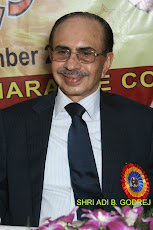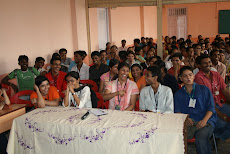This is a brief report on the Business Seminar organised at Y.B. Chavan Centre by MEDC on Economic Outlook and Business Prospects for 2009-10. The key note address was delivered by Dr. Suresh Tendulkar, Chairman, PM's Economic Council.
Dr. Tendulkar began by telling about a Chinese word "wei ji" which is supposed to mean both crisis and opportunities. The global financial crisis should be seen as an opportunity to increase efficiency and productivity. Further any crisis can make people wiser. It has brought all central banks together abandoning their usual 'beggar thy neighbour' attitude. Milton Friedman and even the current Fed Chief argued that central banks are to be blamed for such financial crisis.
"
Great Depression is caused by the poor policy making by the central bank." Milton Friedman.
Dr. Suresh Tendulkar tried to lessen the anxiety of the people who came to attend the seminar by saying that one should not bother too much about the stock markets. "
The most sensible thing about the sensex is that it does not make any sense!"
Elaborating the theme of his lecture 'Economic Outlook' he stated that any economic forecast is conditional since the policy makers can only provide incentives or disincentives while the success depends on many factors.
The economic outlook for fiscal 2009-10 is made on a number of assumptions relating to the expected turnaround of the global economy and a host of domestic factors. The positive factors are the expectations that the financial markets may revive sooner due to the co-ordinated efforts of the central banks in fighting recession. Since November, major central banks have been cutting interest rates to spur growth. The European Central Bank reduced the rate to 2.5% while the Bank of England went a step further to bring down the key rate to 2% for the first time since its inception.
The fairly optimistic outlook by the Prime Minister's Advisory Council is based on a couple of domestic factors like a 5% growth in agriculture for many years which created strong rural demand. He said that the Indian agriculture is not affected badly by the global meltdown. However, demand in the urban sector has been affected as a consequence of the rising interest rates. Dr. Tendulkar was of the view that the fiscal stimulus and easing of the rates by RBI would help the urban consumers. Better foreign exchange position is also giving us confidence.
He reminded the audience that the comfortable position that we enjoy today is the result of the dismantling of government controls since 1991.
On the flip side he pointed towards the poor progress in infrastructure due to lack of coordination between the central and state agencies and the underperforming power sector. Though we can expect some improvement in the power sector when gas from Kaveri Basin and other sources start commercial production.
Answering queries on the financial sector he opined that asset quality will deteriorate in the short run before the situation improves. After all, the so called 'vanila 'or 'exotic' instruments had turned 'toxic' all over the world. Dr Tendulkar ended his discourse by warning against the 'irrational pessimism' created by the media on the impact of global financial turmoil on Indian economy.(Are we moving from 'irrational exuberance' to 'irrational pessimism'?)
Some quotes from
Milton Friedman:
"
Governments never learn. Only people learn.""
Nothing is so permanent as a temporary government programme."





